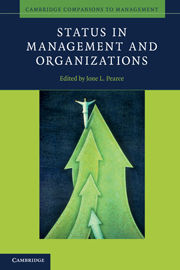Book contents
- Frontmatter
- Contents
- Figures
- Tables
- Contributors
- Foreword
- Preface
- 1 Introduction: The power of status
- Part I How status differences are legitimated
- Part II The influence of status on markets
- Part III The role of status in new industries and ventures
- Part IV When ascriptive status trumps achieved status in teams
- 8 Status cues and expertise assessment in groups
- 9 The malleability of race in organizational teams
- Part V Status in the workplace
- Part VI Developing status and management knowledge
- Index
- References
8 - Status cues and expertise assessment in groups
How group members size one another up … and why it matters
from Part IV - When ascriptive status trumps achieved status in teams
Published online by Cambridge University Press: 05 June 2012
- Frontmatter
- Contents
- Figures
- Tables
- Contributors
- Foreword
- Preface
- 1 Introduction: The power of status
- Part I How status differences are legitimated
- Part II The influence of status on markets
- Part III The role of status in new industries and ventures
- Part IV When ascriptive status trumps achieved status in teams
- 8 Status cues and expertise assessment in groups
- 9 The malleability of race in organizational teams
- Part V Status in the workplace
- Part VI Developing status and management knowledge
- Index
- References
Summary
As contemporary organizations increasingly rely on task groups to perform complex, knowledge-intensive work, the ability of these groups to effectively leverage the knowledge and expertise of individual members has become ever more important. It is almost invariably the case that groups operating in real-world task environments will be composed of members who differ in the task-relevant knowledge and expertise that they bring to the group. These differences typically correlate with differences in education, experience, training, or natural ability, and can emerge naturally or as the result of intentional design decisions that place individuals with greater expertise in groups with less-expert individuals. Yet, regardless of the origin of expertise differences, a key challenge facing groups with expertise diversity is to ensure that members know who their more expert teammates are so that superior expertise is leveraged in decision making and problem solving. A growing body of research evidence suggests that task groups perform better when members are able to accurately identify and then defer to their more expert members (Bunderson, 2003a; Bottger, 1984; Libby, Trotman, and Zimmer, 1987; Littlepage et al., 1995; Littlepage, Robison, and Reddington, 1997; Stewart and Stasser, 1995).
However, the research evidence also suggests that the identification of member expertise is not a simple or straightforward problem (Miner, 1984; Littlepage et al., 1995; Littlepage and Mueller, 1997; Littlepage, Robison, and Reddington, 1997; Trotman, Yetton, and Zimmer, 1983). Expertise is not a visible or observable characteristic. As a result, group members must rely on those characteristics that are visible and observable in drawing inferences about the relative expertise of group members. But these manifest characteristics are not equally valid (i.e., accurate) or reliable (i.e., consistent and dependable) as indicators of actual expertise differences. Consequently, groups can, and often do, make attribution errors by deferring to members who “seem” like they should be experts but are not, or by overlooking members who do possess valuable expertise but do not give that impression. The result is squandered human capital and underperforming groups.
Information
- Type
- Chapter
- Information
- Status in Management and Organizations , pp. 215 - 237Publisher: Cambridge University PressPrint publication year: 2010
References
Accessibility standard: Unknown
Why this information is here
This section outlines the accessibility features of this content - including support for screen readers, full keyboard navigation and high-contrast display options. This may not be relevant for you.Accessibility Information
- 8
- Cited by
